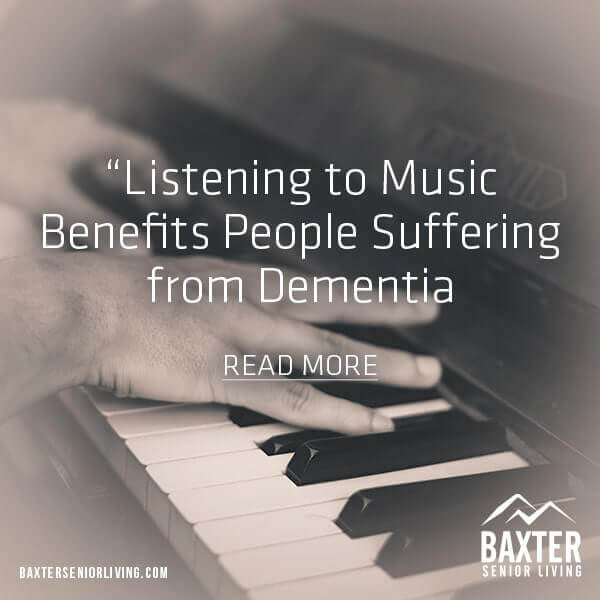It has been well documented that playing a musical instrument enhances cognitive skills such as memory and problem solving abilities, skills which may delay or prevent the onset of dementia symptoms later in life. For those who have not played an instrument, listening to music can also play an important role and improve the quality of life in later years.
Listening to music has been found to enhance the memory and evoke emotions of Alzheimer’s and dementia patients. While a person may struggle to recall a name or a face, sometimes a simple melody will quickly bring back a memory. People are exposed to music throughout their lives. Some may have a special song they associate with a romance or important life event. Emotions and memory are closely linked, and hearing a melody can trigger emotions that the song evoked earlier in life. While a person may not recall the name of the song, he or she can still be moved by a melody which is associated with some important past event.
Multiple clinical studies of older adults with Alzheimer’s and dementia consistently show that listening to familiar music reduced depression and agitation while increasing social skills, physical movement, motivation and cognitive abilities. Researchers believe this is due, in part, to the fact that music stimulates multiple areas of the brain in ways which language, alone, cannot achieve.
One study involved stroke survivors, some of whom listened to their favorite songs a few hours daily while recovering. Results showed that those who listened to music were quicker to regain their verbal skills and the ability to communicate. They were also less likely to become depressed and confused.
Many larger assisted-living facilities employ music in some fashion. This may range from playing music from a familiar era over the hallway intercom system to music instruction, listening classes or actual music therapy.
Music therapy originated in the wake of World War II when medical personnel found that their patients improved after listening to music. Today, it is a well-recognized practice in which music is used to achieve specific individualized goals to help a person engage and better communicate with others. Music is also often employed to reduce the agitation frequently felt by dementia patients.
Therapy can take place with a single person or in a group setting. For example, playing music from the 1950s to a group of people in their eighties may trigger fond memories which can be shared with others in this setting. Music provokes conversation and interaction and can be used to increase levels of physical, emotional and social functioning.
Assisted living facilities often have group exercise sessions involving age appropriate routines. Playing music during these sessions can be highly motivating. The right kind of music can provide the stimulus seniors need to become more active which results in improved health and fitness. When choosing an elder care facility for a family member, opportunities to engage in musically related activities should be an important consideration. This includes opportunities to be involved with singing, dancing, listening to music and watching musical performances.
Music can also provide a healthy substitute for mood controlling drugs. One study of dementia patients showed that the amount of anti-anxiety drugs they required was reduced when they listened to music specifically tailored to their interests. Music reduces stress. Studies have also shown that music can reduce pain and improve sleep quality, benefits which can also lessen the reliance on prescribed drugs.
People’s strongest connection to music is usually with the songs they heard in their teens and twenties. Songs heard at weddings, holiday celebrations, parties or while just driving on a road trip created emotions and memories that can be recalled decades later even by Alzheimer’s patients in later stages of the disease. Music listened to and enjoyed while growing up can continue to improve the quality of life while growing old.


